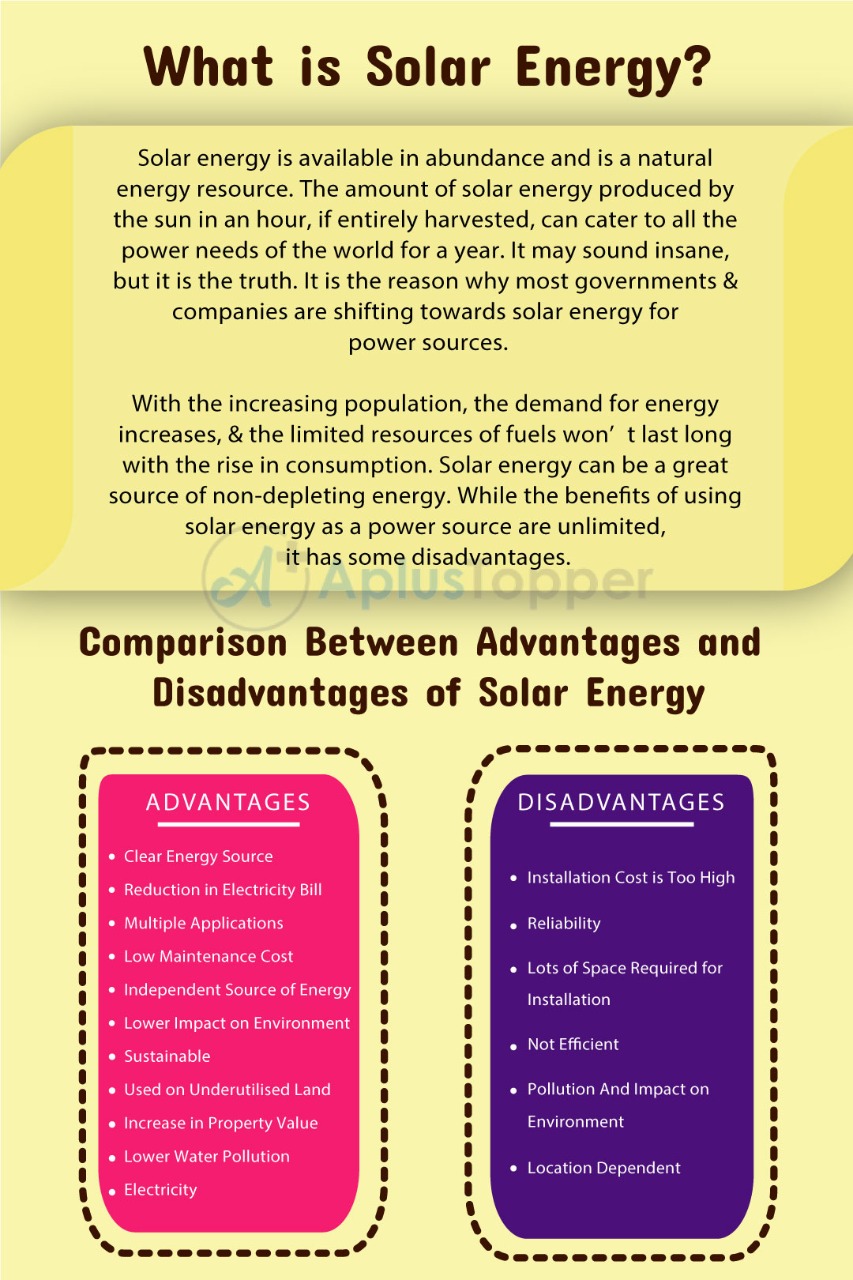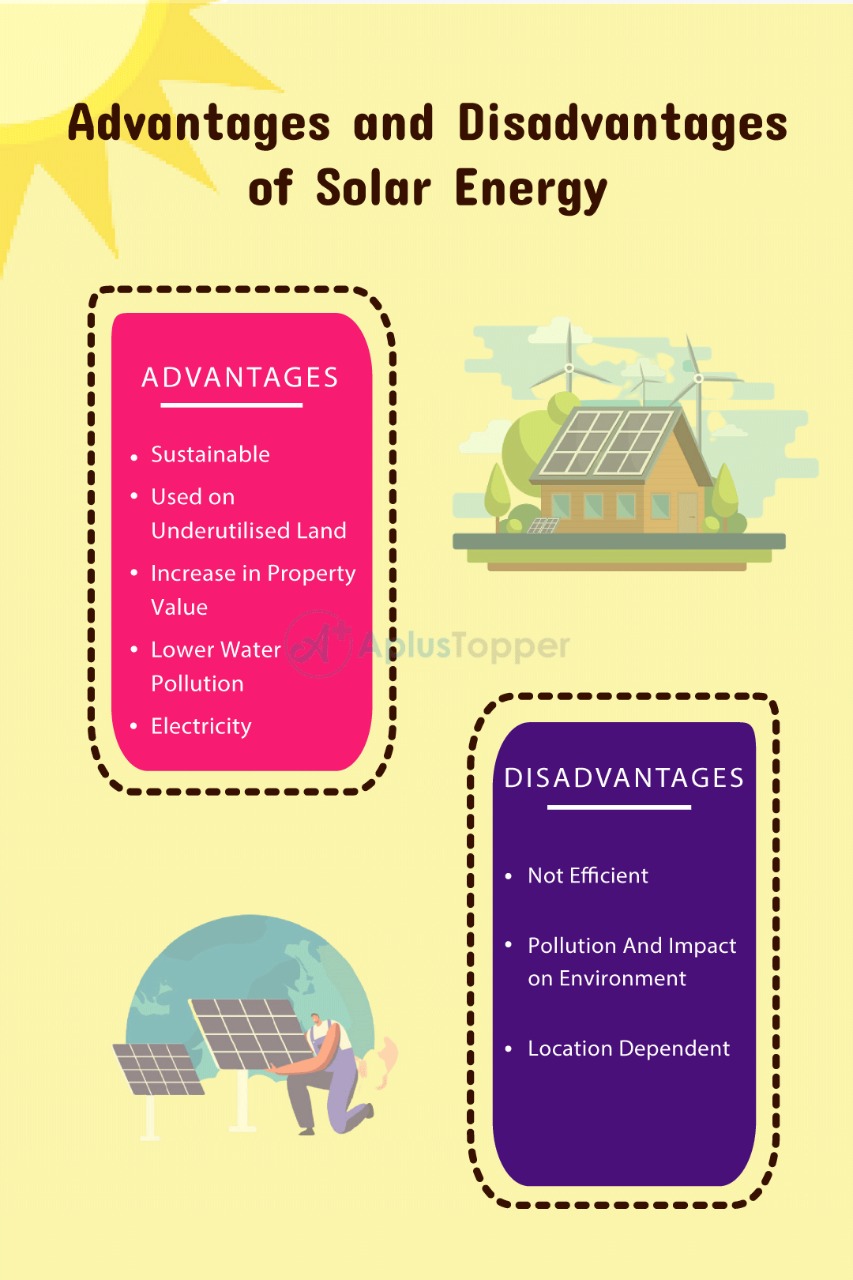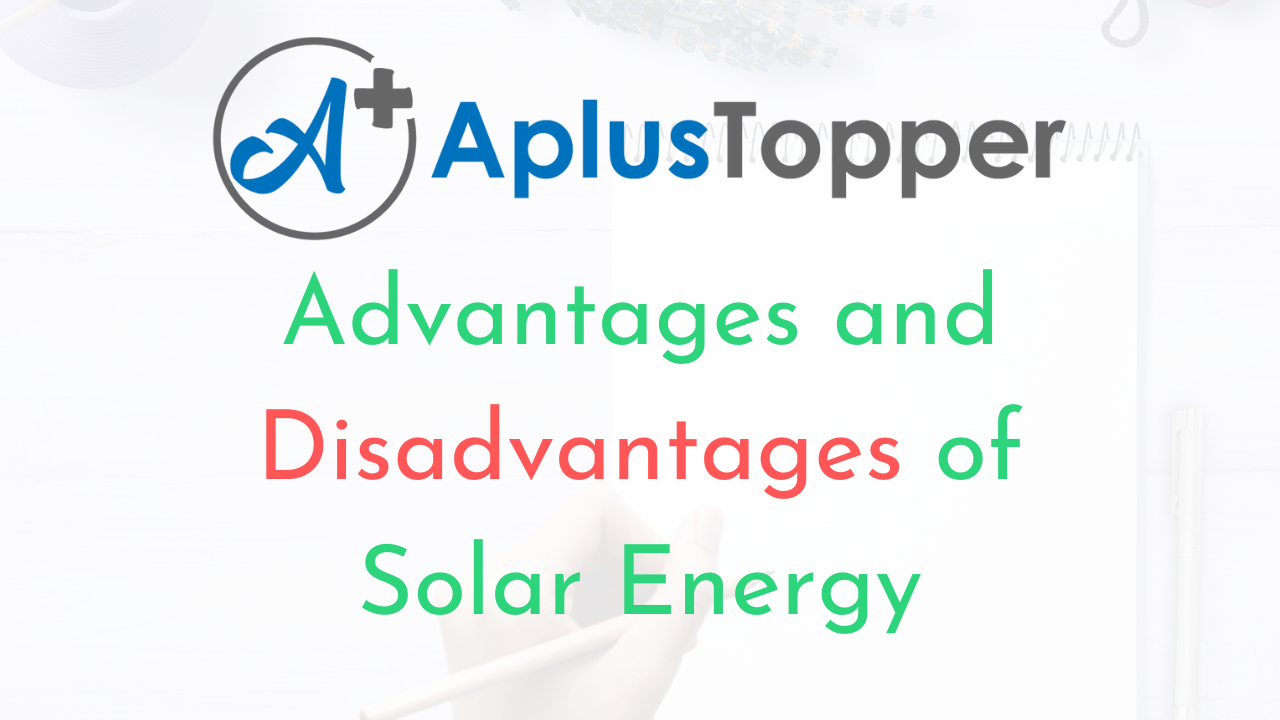Advantages and Disadvantages of Solar Energy: Solar energy is available in abundance and is a natural energy resource. The amount of solar energy produced by the sun in an hour, if entirely harvested, can cater to all the power needs of the world for a year. It may sound insane, but it is the truth. It is the reason why most governments and companies are shifting towards solar energy for power sources.
With the increasing population, the demand for energy increases, and the limited resources of fuels won’t last long with the rise in consumption. Solar energy can be a great source of non-depleting energy. While the benefits of using solar energy as a power source are unlimited, it has some disadvantages.
Students can also find more Advantages and Disadvantages articles on events, persons, sports, technology, and many more.
As it has been said, “not all that glitters is gold,” and this is the case with solar energy. It sure is a clean and renewable source of energy. Still, a lot goes into the manufacturing and installation process that can cause you to rethink before switching to solar energy for all your power consumption needs. Let’s observe some of the benefits and disadvantages of Solar energy here.
- Advantages Of Solar Energy
- Disadvantages of Solar Energy
- Conclusion on Advantages and Disadvantages of Solar Energy

Advantages Of Solar Energy
Clean Energy Source: Solar energy doesn’t have any harmful byproducts and is a clean energy source. It is a renewable source of energy in proper form and is available all over the globe. You can harness solar power freely, and it won’t harm the environment.
Reduction In Electricity Bills: Solar energy reduces power consumption and thereby reduces your electric bills. The reduction in electricity consumption will depend on how much solar energy your solar panel setup produces and how much electricity you use daily.
Multiple Applications: Solar energy has multiple applications. You can either use it to generate heat or electricity. It is beneficial in distant areas where transmission of electricity using lower grid lines is not possible.
Low Maintenance Cost: Solar energy’s other advantage is that solar systems don’t require much maintenance apart from installation cost. The system will work fine if you keep the panels clean. You can easily do it or hire someone to do it for you at a minimal cost.
Manufacturers of the solar panel provide a warranty of up to 20-25 years. Since all the parts are fixed, you don’t need to worry about the wear and tear of moving parts.
Independent Source Of Energy: Many countries don’t have energy resources, and they have to depend on other countries for importing fuels and other resources. Generating enough solar energy to meet all the power demand would be a great solution providing energy independence. The increased rate of fossil fuels will also decrease if every country is self-dependent on producing its energy.
Lower Impact On Environment: Solar energy is renewable energy, and neither the production nor the use of this energy releases any harmful substance into the environment. Apart from being abundantly available, one of the most significant benefits of solar energy is its lower impact on the environment. It reduces harmful gases and carbon emissions into the environment.
Sustainable: With the growth of the population, there is always a risk of energy resources running out. Solar energy is something that will always be there as long as there is a Sun. With solar energy as a power source, the strain on other energy sources decreases, and you don’t have to worry about the depleting level of resources.
Used On Underutilized Land: Installing solar panels on inhabitable lands is a great idea to use the land without disrupting the wildlife. You can also use barren lands that are not suitable for agriculture to install solar power systems.
There is also a new trend of installing solar panels on top of water bodies used for fisheries. It is the brightest idea to install a solar power plant without wasting any ground space.
The rooftop of large buildings and factories is also a great place to install solar panels. The power generated through the panels would lower down the electricity use of the building, and you will utilize an unused area.
Increase In Property Value: If you are getting solar panels installed on the rooftop of your house, you are indirectly increasing the resale value of your home. Next time you sell your home, you can charge more for the panels you have installed. Installation of solar panels can be an investment for homeowners looking to resell their homes shortly.
Lower Water Pollution: Just like every other process of manufacturing, the manufacturing of solar panels leads to some form of water pollution. However, solar panels require much less water than most other energy sources that need water for cooling purposes.
Electricity: Solar energy is an ideal source to create electric power for places where it is hard to get electricity from any other source. Some areas are distant, and solar power is an excellent solution for sites that are hard to connect with the local grid.
Disadvantages of Solar Energy
Installation Cost Is Too High: One of the highest disadvantages of solar energy is the cost of installation. The initial cost for installing a solar power system at your average-sized home can cost anywhere between 15000$ to 30000$, and that too when you don’t include the batteries to store the power. This cost comprises solar panels, wiring, inverter, permits, installation, and system maintenance.
Reliability: A major drawback of solar energy is that it is reliant on sunlight. You can not use a solar power system to generate electricity at night.
For using electricity at night, you need to have some storage to store the power generated during the day, or you need to have some other energy source to meet your power demand at night. It means an increased cost of batteries for storing the power.
Dependent On Weather: Another disadvantage with solar energy is that it is weather-dependent. While solar panels can collect solar power on a rainy and cloudy day, it is much lower than a sunny day’s efficiency.
Weather changes when the seasons change, and that impacts solar energy efficiency. In the summers, you will be able to generate more solar power than winters or rains. Places with longer winters and rainy days are not ideal for investing too much money in solar panels.
Costly Storage: When using solar energy, you would need to use it right away. You can store it in large-capacity batteries, but the cost for those batteries is very high, increasing the overall cost of the solar plant installation. For an average house, it would cost about 20000$ more than the original cost of installation. It would be wiser to use solar energy in the daytime and use the local grid during the night.
Lots Of Space Required for Installation: The higher amount of solar energy generation requires more solar panels to collect as much sunlight as possible. Solar panels need lots of space for installation, and if you are installing them on your roof, then the area might not be sufficient. The amount of space required for installing solar panels also depends upon the time and the intensity of sunlight that place gets.
Not Efficient: Most solar panels are not fully efficient, and they convert only about 22 percent of their total energy into power. Theoretically, the highest energy efficiency would be about 85 percent, and that is when the panels will have mirrors and motors that follow the sun’s movement.
For a system that does not follow the sun’s movement, theoretically, the highest energy efficiency would be about 55 percent. The same is with designs that follow the sun’s direction on a cloudy day.
Pollution And Impact On Environment: While solar energy itself is a renewable source of energy that directly does not impact the environment in the wrong way, it is the manufacturing and the installation of solar panels that harms the environment.
Lead and cadmium are two compounds that are in solar panels and are highly toxic. Several other compounds produced during solar panel manufacturing are harmful, and there are no proper regulations in several countries on how to dispose of them. The transportation of solar panels and other installation requirements also causes pollution.
The land used in installing solar panels is massive, and it can not be used for agriculture, as is the case with windmills.
Location Dependent: Another disadvantage with solar energy is that it is dependent on the location. The area where the solar panel is installed plays a high role in generating power. Not all places on earth get an equal amount of sunlight.
The farther you move from the equator, the less sunlight you will get, and less will be the efficiency of the solar energy.
Solar panels are also prone to deterioration after constantly being outside, and factors like wind, dirt, and rains also damage the panels.

Conclusion on Advantages and Disadvantages of Solar Energy
Solar energy is one the purest form of energy that, if properly utilized, can meet the whole world’s energy needs, and the world would not need the dependence on any other power source. Solar energy is entirely dependent on the sun. As long as there is sun, we don’t need to worry about solar energy.
But there are certain determining factors that everyone must consider before completely switching to solar energy. The initial cost and the space restriction might hamper your plans for installing a solar energy system.
However, solar energy is still evolving, and there might come a day when the installation prices go down and the efficiency increases.
